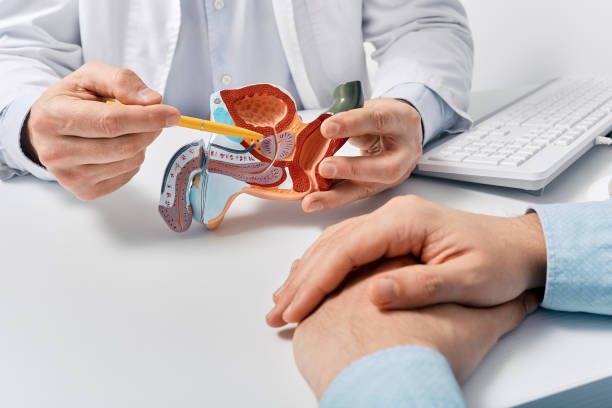Alternative Treatments
Embracing Alternative Treatments for Prostate Cancer
Prostate cancer, one of the most common cancers in males, frequently encourages people to look into alternative treatment alternatives. While surgery, radiation therapy, and chemotherapy are still common techniques, a growing number of patients are turning to alternative treatments as additional therapies or primary interventions. In this article, we look at alternative treatments for prostate cancer, comparing the efficacy, safety, and potential advantages of several holistic approaches.
Join us as we explore the wide range of alternative treatments accessible to prostate cancer patients, including dietary adjustments, herbal supplements, mind-body approaches, and lifestyle changes. By casting light on these lesser-known methods, we hope to equip patients with a thorough grasp of their options, allowing them to make educated decisions about their health and well-being in the face of this difficult diagnosis.

Understanding Prostate Cancer
Prostate cancer is a form of cancer that develops in the prostate gland, which is part of the male reproductive system. The prostate gland is found right beneath the bladder and in front of the rectum. It secretes a fluid that is a component of semen.
Diagnosis and Symptoms
Prostate cancer may not present any signs in its early stages. However, if the cancer progresses, it may produce symptoms like:
- Frequent urinating, particularly at night
- Difficulty beginning or stopping urination
- Weak or interrupted urine flow.
- Urinary pain or burn
- Blood in the urine or semen
- Chronic pain in the back, hips, or pelvis.
If somebody develops any of these symptoms, they should consult a doctor. A doctor may do a digital rectal exam (DRE) to look for tumors or other abnormalities in the prostate gland. They may also request a prostate-specific antigen (PSA) test, which evaluates the amount of PSA in the blood. High PSA levels may indicate prostate cancer.
Conventional Treatments
Conventional therapies for prostate cancer include:
- Surgery: The prostate gland is surgically removed.
- Radiation therapy uses high-energy beams to attack cancer cells.
- Chemotherapy: Drugs are used to destroy cancer cells.
While these therapies can be successful, they can also result in adverse effects like impotence, incontinence, and gastrointestinal difficulties.
Alternative treatments for prostate cancer may help to mitigate some of these negative effects. However, unconventional remedies should not be utilized in place of traditional therapy.

Alternative Medicine Approaches
Alternative medicine procedures can be used in conjunction with traditional treatments to assist reduce symptoms linked with prostate cancer. It is crucial to highlight that alternative treatments cannot completely replace mainstream therapy. It is recommended that people consult with their healthcare professional to determine the best balance.
Diet and Nutrition
A nutritious diet rich in fruits and vegetables may lower the incidence of prostate cancer while also improving general health. Some research suggests that green tea, which includes antioxidants, could also be beneficial. It is critical to restrict the consumption of processed meals, red meat, and dairy products.
Herbal and Vitamin Supplementation
Some herbal and vitamin supplements may help alleviate symptoms linked with prostate cancer. Lycopene, present in tomatoes, may help lower the incidence of prostate cancer. Saw palmetto berry may also assist with symptoms like frequent urination. However, before using any supplements, see your healthcare physician.
Physical and Mind-Body Practices
Physical activity, such as exercise, may help reduce the incidence of prostate cancer while also improving overall health. Yoga, tai chi, and meditation are all mind-body techniques that can aid with stress reduction and quality of life. Deep breathing and other relaxation techniques may also help.
Alternative medicine procedures can be used in conjunction with traditional treatments to assist reduce symptoms linked with prostate cancer. It is crucial to highlight that alternative treatments cannot completely replace mainstream therapy. It is recommended that people consult with their healthcare professional to determine the best balance.

Integrative Oncology
Integrative oncology is a patient-centered, evidence-based branch of cancer care that integrates conventional Western medicine with complementary and alternative treatments that have been studied and confirmed to be safe and helpful in healing. It is a cancer care approach that focuses on the complete person rather than simply the disease, with the goal of improving the quality of life for cancer patients.
Combining Conventional and Complementary Methods
Integrative oncology combines traditional cancer treatments (such as surgery, chemotherapy, and radiation therapy) with complementary and alternative medicine (CAM) therapies like acupuncture, massage, meditation, and yoga. The goal is to give a complete approach to cancer care that considers the patient’s physical, emotional, and spiritual requirements.
One advantage of integrative oncology is that it can assist manage the negative effects of standard cancer treatments. Acupuncture, for example, has been demonstrated to alleviate chemotherapy-induced nausea and vomiting, while massage treatment can aid with pain and anxiety reduction.
Clinical Trials and Research
Integrative oncology is a relatively new discipline, with much of the research still in its preliminary stages. However, there is rising scientific evidence to support the use of specific CAM therapies in cancer treatment.
Clinical trials are being done to assess the safety and efficacy of integrative oncology treatments. For example, a study published in the Journal of Clinical Oncology discovered that integrative oncology therapies, such as acupuncture and meditation, can improve cancer patients’ quality of life and lessen symptoms.
It is crucial to highlight that not all CAM therapies are safe or successful, and patients should always contact their doctor before beginning any new treatment. Integrative oncology should be used in conjunction with a comprehensive cancer treatment plan, and patients should always follow their doctor’s cancer care recommendations.

Support and Quality of Life
Cancer patients frequently encounter a variety of side effects during therapy, such as pain, exhaustion, nausea, anxiety, despair, and trouble sleeping. These side effects can have a major influence on their overall quality of life. Fortunately, there are alternative treatments and support systems available to help prostate cancer patients manage these adverse effects and enhance their overall quality of life.
Coping with Side Effects
Pain is one of cancer treatment’s most common side effects. Acupuncture, massage therapy, and meditation have all been proven to help cancer patients lower their discomfort. Furthermore, natural treatments like ginger and turmeric may help relieve pain and inflammation.
Fatigue is a typical adverse effect of cancer treatment. Gentle workouts, such as yoga and tai chi, can help boost energy and minimize weariness. In addition, herbal medications like ginseng and ashwagandha may assist cancer patients to enhance their energy levels and minimize weariness.
Nausea is a typical adverse effect of chemotherapy and radiation treatment. Ginger and peppermint have been demonstrated to effectively reduce nausea in cancer patients. Furthermore, certain individuals may benefit from medical marijuana, which has been demonstrated to alleviate nausea and increase appetite.
Emotional and Psychological Support
Cancer patients frequently face emotional and psychological anguish throughout therapy. Support groups and counseling can help patients deal with the emotional and psychological effects of cancer. The American Cancer Society provides a variety of services, including counseling, support groups, and internet resources.
In addition to support groups and counseling, mindfulness meditation, and relaxation practices can assist cancer patients overcome anxiety and sadness. These approaches can help people manage stress and enhance their overall health.
Overall, alternative treatments and support systems can assist cancer patients deal with treatment-related side effects and enhance their overall quality of life. It is critical for patients to collaborate with their healthcare physician to create a complete treatment plan that addresses both their physical and emotional requirements.
Conclusion
In conclusion, while conventional treatments for prostate cancer are still important in the fight against the disease, alternative treatments can provide vital adjunctive support and improve patients’ general well-being. Alternative treatments, which range from dietary changes and herbal supplements to mind-body practices and lifestyle changes, offer a wide range of possibilities for people dealing with prostate cancer. While some alternative treatments lack strong scientific proof, many patients find comfort, solace, and a higher quality of life through these holistic techniques. It is critical for patients to communicate openly with their healthcare providers, incorporating alternative treatments into a comprehensive care plan suited to their specific requirements and preferences. Patients who embrace a multifaceted approach to prostate cancer therapy can improve their health outcomes and develop a sense of empowerment on their path to healing and recovery.
Trusted Health, Wellness, and Medical advice for your well-being


